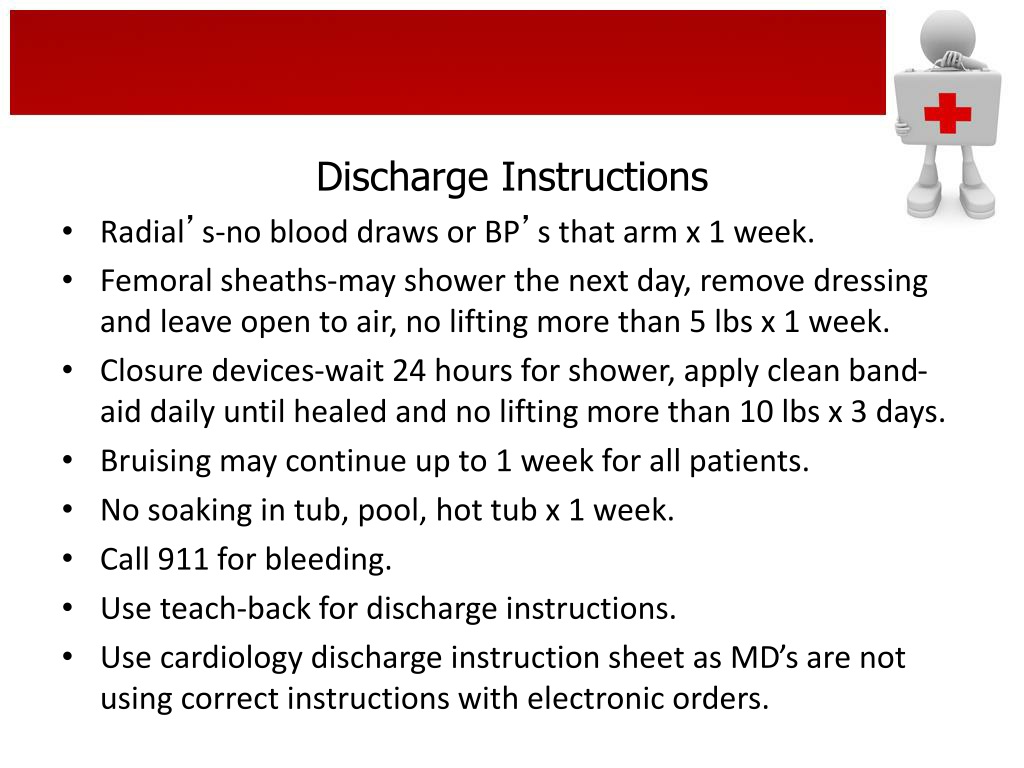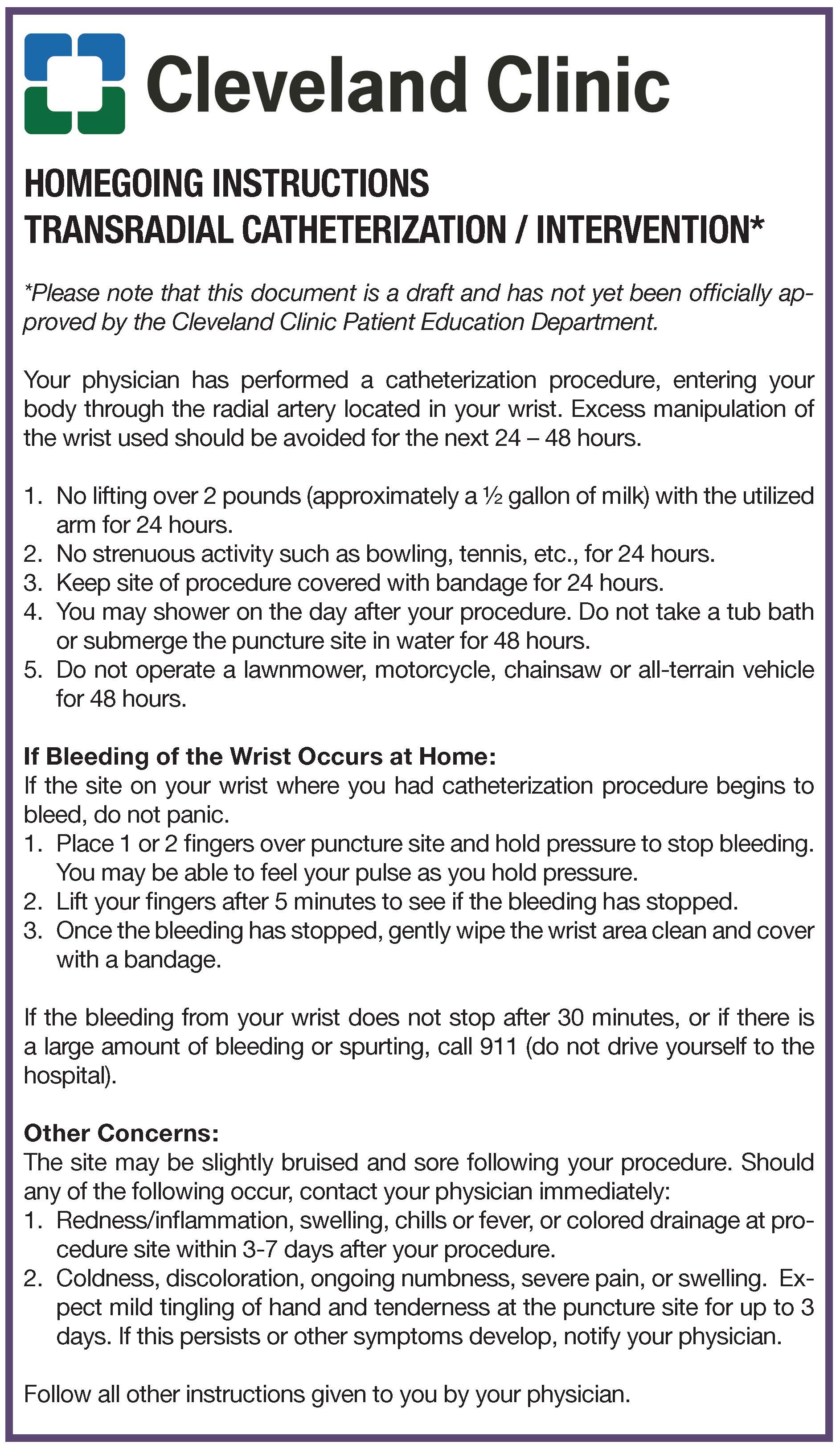Discharge Instructions After Cardiac Catheterization
Discharge Instructions After Cardiac Catheterization - Physicians can also examine cardiac blood. Cardiac catheterization involves passing a thin flexible tube (catheter) into the right or left side of the heart. After leaving the hospital, you should rest as much as possible for 24 hours, standing and walking only as necessary (such as going to. Cardiac catheterization is used to identify to which extent the heart functions healthily. The catheter is most often inserted.
After leaving the hospital, you should rest as much as possible for 24 hours, standing and walking only as necessary (such as going to. Cardiac catheterization is used to identify to which extent the heart functions healthily. Cardiac catheterization involves passing a thin flexible tube (catheter) into the right or left side of the heart. Physicians can also examine cardiac blood. The catheter is most often inserted.
Cardiac catheterization involves passing a thin flexible tube (catheter) into the right or left side of the heart. The catheter is most often inserted. Cardiac catheterization is used to identify to which extent the heart functions healthily. Physicians can also examine cardiac blood. After leaving the hospital, you should rest as much as possible for 24 hours, standing and walking only as necessary (such as going to.
Discharge instructions process RPA Automation in Healthcare Featsystems
After leaving the hospital, you should rest as much as possible for 24 hours, standing and walking only as necessary (such as going to. Physicians can also examine cardiac blood. Cardiac catheterization involves passing a thin flexible tube (catheter) into the right or left side of the heart. The catheter is most often inserted. Cardiac catheterization is used to identify.
Cardiac Catheterization Uses, Procedure, Results
After leaving the hospital, you should rest as much as possible for 24 hours, standing and walking only as necessary (such as going to. Physicians can also examine cardiac blood. Cardiac catheterization involves passing a thin flexible tube (catheter) into the right or left side of the heart. Cardiac catheterization is used to identify to which extent the heart functions.
Text Discharge Instructions for Cardiac Catheterization HealthClips
Cardiac catheterization is used to identify to which extent the heart functions healthily. Cardiac catheterization involves passing a thin flexible tube (catheter) into the right or left side of the heart. The catheter is most often inserted. After leaving the hospital, you should rest as much as possible for 24 hours, standing and walking only as necessary (such as going.
Ati Diagnostic Procedure Template Cardiac Catheterization
After leaving the hospital, you should rest as much as possible for 24 hours, standing and walking only as necessary (such as going to. Cardiac catheterization involves passing a thin flexible tube (catheter) into the right or left side of the heart. Cardiac catheterization is used to identify to which extent the heart functions healthily. The catheter is most often.
PPT Managing Vascular Complications of Cardiac Catheterization Your
Cardiac catheterization is used to identify to which extent the heart functions healthily. Cardiac catheterization involves passing a thin flexible tube (catheter) into the right or left side of the heart. The catheter is most often inserted. After leaving the hospital, you should rest as much as possible for 24 hours, standing and walking only as necessary (such as going.
Transradial PostProcedure Protocols
Physicians can also examine cardiac blood. The catheter is most often inserted. After leaving the hospital, you should rest as much as possible for 24 hours, standing and walking only as necessary (such as going to. Cardiac catheterization is used to identify to which extent the heart functions healthily. Cardiac catheterization involves passing a thin flexible tube (catheter) into the.
Heart Surgery Global Cardiovascular Nursing Leadership Forum
The catheter is most often inserted. Physicians can also examine cardiac blood. After leaving the hospital, you should rest as much as possible for 24 hours, standing and walking only as necessary (such as going to. Cardiac catheterization involves passing a thin flexible tube (catheter) into the right or left side of the heart. Cardiac catheterization is used to identify.
PDF Discharge Instructions for Cardiac Catheterization HealthClips
Cardiac catheterization involves passing a thin flexible tube (catheter) into the right or left side of the heart. Physicians can also examine cardiac blood. After leaving the hospital, you should rest as much as possible for 24 hours, standing and walking only as necessary (such as going to. The catheter is most often inserted. Cardiac catheterization is used to identify.
CARDIAC CATHETERIZATION Nurse Info
Cardiac catheterization involves passing a thin flexible tube (catheter) into the right or left side of the heart. Cardiac catheterization is used to identify to which extent the heart functions healthily. Physicians can also examine cardiac blood. After leaving the hospital, you should rest as much as possible for 24 hours, standing and walking only as necessary (such as going.
PDF Discharge Instructions SelfCatheterization for Women
Physicians can also examine cardiac blood. The catheter is most often inserted. Cardiac catheterization involves passing a thin flexible tube (catheter) into the right or left side of the heart. Cardiac catheterization is used to identify to which extent the heart functions healthily. After leaving the hospital, you should rest as much as possible for 24 hours, standing and walking.
Physicians Can Also Examine Cardiac Blood.
The catheter is most often inserted. Cardiac catheterization is used to identify to which extent the heart functions healthily. Cardiac catheterization involves passing a thin flexible tube (catheter) into the right or left side of the heart. After leaving the hospital, you should rest as much as possible for 24 hours, standing and walking only as necessary (such as going to.

:max_bytes(150000):strip_icc()/1745251_color-5ba16b804cedfd0025ccc2d3.png)







